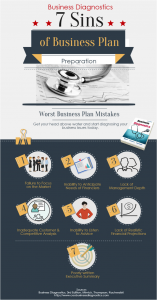The Seven Sins of Business Plan Preparation
 With small business, you may not need a 25+ page business plan but you do need to understand the elements of your strategy, tactics and operational plan. And in our opinion, write it down. Just like a Fortune 500 firm – you can’t get where you are going without a good map.
With small business, you may not need a 25+ page business plan but you do need to understand the elements of your strategy, tactics and operational plan. And in our opinion, write it down. Just like a Fortune 500 firm – you can’t get where you are going without a good map.
Unfortunately, a lot of business people whether they are running a micro business out of their house or a large technology firm make similar errors in their business planning process! Here are what we at Business Diagnostics think are the 7 worst business plan mistakes along with a checklist to fixing those pesky business plan mistakes.
- Failure to Focus on the Market
- Strive to be market driven (meeting customer needs) rather than technology driven. The potential of the marketplace and resulting revenue/earnings is far more important than your product’s technical features.
- Demonstrate the users’ benefit rather than promoting the product’s virtues and innovation.
- Document booking orders with supporting data indicating the number of customers who have committed to purchase. This allows you to provide a convincing projection of the “rate of acceptance” for the product or service and the pace at which it is likely to be sold.
- Failure to Anticipate Investors’ or Lenders’ Requirements
Too often, business plans skim over the meat and potatoes of financial planning and don’t consider what the needs of those who are supplying the cash. Particularly with small business, if you are using a line of credit for working capital, it is important to consider what information your bank needs.
- Lenders: Why is financing required? Amount of funds required? Repayment: Over what timeline and from what source (ongoing earnings, sale of assets?) Security: What company assets are available?
- Inability to Emphasize & Demonstrate Management Depth
- Does your management team have:
- Proven industry experience?
- Previous start-up experience?
- Track record in bringing new products / services to market?
- If not, how will you mitigate the gaps in management experience?
- Inadequate Customer Definition and Competitor Analysis
The business plan is your opportunity to really make sure you understand your customers and competition yet one of the biggest business plan mistakes is the lack of effort in really understanding customers and competitors.
- Customers
- Segmentation – Which are the most attractive segments?
- Targeting – Who is buying from you?
- Preferences – What do they buy from you and what will they buy again?
- Timing – When do they buy?
- Criteria – Why do they buy?
- Competition
Demonstrate your knowledge of the competition, how you are keeping track of them (latest product offerings, price discounts, marketing etc.) and how you differentiate yourself from them.
- Defensiveness or Inability to adapt to Feedback
Show drafts of your business plan to business advisors, senior management and other key employees.
Inability to adapt or listen to experienced advisors is a critical mistake. Is all feedback right? Of course not, but not being able to hear and adapt to fair criticism is a key element of business failure.
- Lack of Realistic Financial Projections
In small business you may not have investors and lenders. Nonetheless, projections and revenues, gross margins and earnings have to be carefully supported by facts. Too much guessing can mean you won’t be able to meet your obligations. Complete ‘best-expected-worst case’ scenarios. Don’t just give a hockey stick growth projection – demonstrate that you have injected realism!
- Writing the Executive Summary First
Unfortunately, time pressures and enthusiasm often leads small business people to write their executive summary first and support it with their plans instead of the other way around. The executive summary is a chance to check your assumptions and make sure you told the story based on the data in your business plan. So write it last! Writing an executive summary first means you are jumping to the solution and not using the business planning process to learn.
This content is adapted for the SOHO audience from the business book, Business Diagnostics – 3nd edition – authored by Richard Mimick, Michael Thompson and Terry Rachwalski and presented with permission from the authors. Co-author and management consultant, Terry Rachwalski will be on the afternoon SOHO Victoria panel, “So you want to start a business”. She has written or contributed to dozens of business plans for internal operation and financing purposes. As a business consultant and MBA prof, she is often called on to help out with or critique business plans. Inevitably, the businesses that fail to get funding or even get off the ground have made similar errors with their business plans.
Well done! It’s great to see someone mentioning how important it is to consider the requirements of the lender or investor. Unbelievably, this is overlooked far too often.